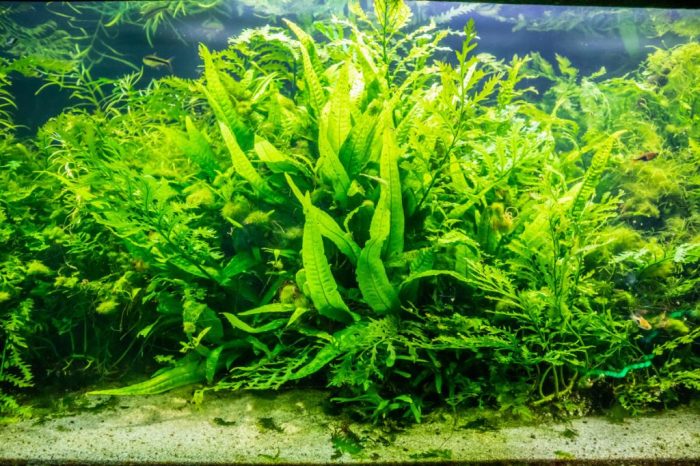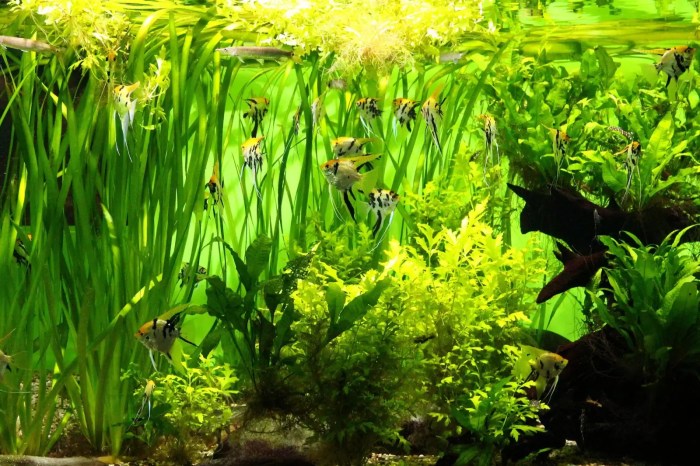Can You Use Fish Tank Water for Plants?
Using Fish Tank Water for Plants: A Comprehensive Guide

Source: aquaticoceans.com
Can you use fish tank water for plants – Repurposing fish tank water for plants offers a sustainable and potentially beneficial approach to plant care. This practice leverages the nutrient-rich nature of used aquarium water, reducing waste and providing a natural fertilizer source. However, it’s crucial to understand the composition of fish tank water and take precautions to avoid harming your plants.
Nutrient Content of Fish Tank Water
Fish tank water contains various nutrients vital for plant growth, primarily derived from fish waste and uneaten food. These include nitrogen (in the form of ammonia, nitrites, and nitrates), phosphorus, and potassium. However, the levels of these nutrients vary significantly depending on factors such as the number and type of fish, feeding frequency, and tank maintenance practices. Overly high concentrations of certain nutrients, like nitrates, can be detrimental.
Conversely, insufficient levels may not provide substantial benefits compared to commercial fertilizers.
Comparing the nutrient profile of fish tank water to commercially available fertilizers reveals key differences. While fish tank water offers a naturally occurring mix of nutrients, fertilizers provide precise concentrations of specific elements. This controlled approach allows for tailored nutrient delivery based on the plant’s specific needs.
| Nutrient | Fish Tank Water Level (Approximate Range) | Fertilizer Level (Typical Range) | Comparison |
|---|---|---|---|
| Nitrogen (Nitrate) | 5-50 ppm | 50-200 ppm (depending on the fertilizer and plant) | Fish tank water may provide some nitrogen, but commercial fertilizers offer more consistent and controllable levels. |
| Phosphorus | 0.5-5 ppm | 10-50 ppm (depending on the fertilizer and plant) | Fish tank water usually contains lower phosphorus levels than most fertilizers. |
| Potassium | 1-10 ppm | 50-200 ppm (depending on the fertilizer and plant) | Fish tank water typically provides lower potassium than commercial fertilizers. |
Potential Contaminants in Fish Tank Water
While fish tank water offers nutrients, it may also contain harmful substances. Ammonia, nitrites, and high levels of nitrates are toxic if not properly managed through the nitrogen cycle. Additionally, medications used to treat fish diseases can be detrimental to plants. Therefore, testing the water before use is paramount.
Testing involves using readily available aquarium water test kits to measure ammonia, nitrite, and nitrate levels. These kits typically provide color-coded comparisons to determine the concentration of each substance. High levels of any of these substances indicate the water is unsuitable for plants without proper dilution or treatment.
Using fish tank water for plants is a common question among hobbyists. The water’s suitability depends largely on its pH level; fish often thrive in slightly alkaline conditions, leading to the question: can you use alkaline water for plants ? Understanding this helps determine if your fish tank water, potentially already alkaline, will benefit or harm your plants.
Ultimately, testing the water’s pH and nutrient levels before application is crucial for plant health.
The following flowchart Artikels a safe assessment procedure:
(A flowchart would be inserted here depicting the steps of testing water parameters, diluting if necessary, and then proceeding with plant watering. The steps would include: 1. Test water for ammonia, nitrite, nitrate, and pH. 2. If levels are high, dilute with clean water.
3. If levels are safe, proceed to watering. 4. Monitor plant health after application.)
pH and Water Hardness

Source: bantam.earth
pH and water hardness significantly influence plant growth. Optimal pH ranges vary depending on the plant species. Similarly, water hardness, reflecting the concentration of minerals like calcium and magnesium, also affects nutrient uptake. Fish tank water typically has a pH and hardness level that may or may not be suitable for your plants.
Many common houseplants tolerate a range of pH and hardness levels, but matching them to your fish tank water’s characteristics is essential. Improper pH can hinder nutrient absorption, while extreme hardness can cause salt buildup.
- Pothos: Tolerates a wide pH range (6.0-7.5) and various hardness levels.
- Snake Plant: Prefers slightly alkaline pH (6.5-7.5) and moderate hardness.
- Peace Lily: Thrives in slightly acidic to neutral pH (6.0-7.0) and moderate hardness.
- Spider Plant: Adaptable to a range of pH (6.0-7.5) and hardness levels.
Practical Application and Methods

Source: modestfish.com
Collecting fish tank water should be done carefully, avoiding debris and uneaten food. Diluting the water is crucial to prevent potential harm to plants from high nutrient concentrations or harmful substances. A typical dilution ratio might be 1:1 (fish tank water to clean water), but this can vary depending on the test results.
Application methods include watering directly at the soil level or foliar spraying (spraying the leaves). Foliar spraying is best for plants that readily absorb nutrients through their leaves.
- Test your fish tank water using an aquarium test kit.
- Dilute the fish tank water with clean water, if necessary, based on test results.
- Water your plants using the diluted fish tank water, ensuring the soil is thoroughly moistened.
- Monitor your plants for any signs of stress or nutrient deficiencies. Adjust watering frequency and dilution as needed.
Long-Term Effects and Considerations, Can you use fish tank water for plants
Consistent use of fish tank water can affect soil composition over time. Potential issues include salt buildup from mineral accumulation and nutrient imbalances. Regular soil testing and adjustments to fertilization practices may be needed to maintain optimal conditions.
Close monitoring of plant health is essential. Signs of stress, such as wilting, yellowing leaves, or stunted growth, might indicate problems. Adjusting dilution ratios or supplementing with commercial fertilizers can help address these issues.
- Regularly test your soil’s pH and nutrient levels.
- Flush the soil periodically with clean water to prevent salt buildup.
- Supplement with commercial fertilizers if needed to address any nutrient deficiencies.
- Observe your plants carefully for any signs of stress or disease.
General Inquiries: Can You Use Fish Tank Water For Plants
Can I use all types of fish tank water?
No. Water from tanks with diseased fish or those treated with medications should never be used on plants.
How often can I water my plants with fish tank water?
Start with occasional supplemental watering and observe your plants’ response. Overwatering can be detrimental.
What if my fish tank water is cloudy?
Cloudy water likely indicates an imbalance; test it before use and consider clarifying it before applying to plants.
Will using fish tank water affect my soil’s pH?
It might; regular soil testing is recommended to ensure the pH remains optimal for your plants.




















